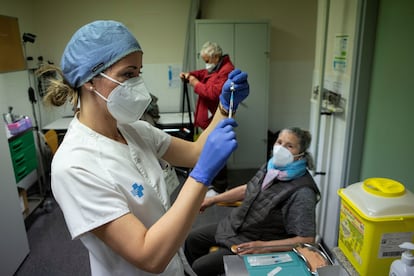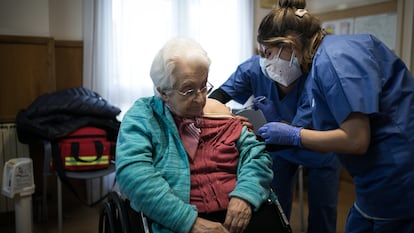Covid passport: The new worlds opening up for the vaccinated
Spain supports the creation of a European Union document to ease travel for those who have been fully immunized. But the idea has raised medical and ethical concerns


While vaccines have provided some relief from the Covid-19 pandemic, there is still quite a way to go: immunized individuals are protected from severe forms of the disease, but they can still catch the virus, and it is not yet known how many more people they can infect (although this number is thought to be low).
In Spain, only 2.8% of the population has been fully vaccinated and there is no herd immunity. With another major holiday coming up, Easter, and the subsequent risk of a new spike in infections, regional governments – which are in charge of coronavirus policy – are maintaining measures in place and these apply to everyone, whether immunized or not, including mandatory face masks and restrictions on movement across regional borders.
It affects fundamental rights and opens the door to discrimination between the vaccinated and the unvaccinatedCarmen Cámara, secretary general of the Spanish Immunology Society
But some countries are already opening the door to a new world for those who have received their jabs. In the United States, fully vaccinated people may now gather indoors without masks or social distancing with other immunized people, and also with unvaccinated people from one other household who are at low risk for severe disease, according to the latest guidelines from the US Centers for Disease Control and Prevention (CDC).
Meanwhile, the European Union is working to create a Covid certificate, similar to the Green Pass available in Israel and the vaccination certificate in China, that would ease travel for vaccinated people and help reactivate the economy. According to the European Centre for Disease Prevention and Control (ECDC), the EU has administered close to 38.5 million doses, but fully vaccinated individuals still account for less than 6% of the population in all member states.
This idea of a vaccination passport had already been floated in April of last year by the then-premier of Spain’s Catalonia region, Quim Torra. But the notion was widely rejected by the scientific community and the World Health Organization (WHO) due to a lack of evidence.
Critics also warn that these types of documents raise ethical issues, especially at a time when access to doses is limited.
No changes in Spain
More than 1.4 million people have been fully vaccinated in Spain, but it is unclear whether this means they cannot infect others. One UK study suggesting as much has yet to be peer-reviewed or published in a scientific journal. “Scientifically we cannot say that an immunized person does not transmit [the coronavirus]. There is no proof of zero risk,” notes Carmen Cámara, secretary general of the Spanish Immunology Society.
Faced with this uncertainty, experts and health authorities are falling back on the “principle of prudence.” This means that vaccinated people in Spain do not have any significant advantages over those who are not, at least not for now. Residents of nursing homes, who have by now mostly been immunized, have more flexible visiting rules after months of very tough restrictions due to the fact that care homes became epicenters of infection and deaths.

Daniel López Acuña, a former emergencies official at the WHO, notes that “the vaccine is not life insurance against any contingency. It’s insurance against dying, not against getting infected. It’s best to take care of yourself and others.”
“There are unwanted effects in any community intervention,” says the infectious disease specialist Oriol Mitjà, who supported the idea of an immunization passport in Catalonia a year ago. He says that while zero risk of transmission among the vaccinated cannot be assured, these are risks that can be mitigated with preventive measures like face masks.
“The alternative to the [vaccination] pass is closing for everyone. But you cannot open for everyone because that puts public health at risk,” he says.
Cámara proposes more testing instead of a passport. “We should reinforce diagnostic tests on arrivals: a mandatory antigen test for any tourist arriving in the country,” she says. “I think that would be more equal and effective.”
EU and the world
In Israel, where half of the population has been immunized, the Health Ministry has created a Green Pass giving vaccinated people access to restricted sites such as gyms, bars and theaters. And China has launched a certificate showing a person’s vaccination data and diagnostic tests that aims to facilitate cross-border travel.
Meanwhile, the EU is accelerating work on a vaccine passport that would ease travel among member states. After preliminary talks with national governments, the EU Commission is considering the option of including people with negative PCR tests and those who have recovered from the disease. The Commission wants to present the passport on March 17 with a view to saving the summer season. But it is unclear what the document will be used for – presumably to enter another country. Eligibility conditions are not known, either.
And there are differences of opinion among member states: while Spain and Greece are encouraging the initiative, France and Luxembourg are rejecting it out of fear of creating “first-class” and “second-class” citizens.
Ethical concerns
The idea of a passport granting privileges to certain people does not just raise health concerns about a false sense of security. “From an ethical point of view, I find it unconscionable, given that there is still no universal access to the vaccine,” says Cámara.
Amós García, of the Spanish Vaccinology Association, agrees. “It’s one thing to have a record in one’s clinical history, to have a vaccine card, and quite another to have an immunization passport when we don’t even know if it prevents infections,” he says. “And in any case, who will have access to those passports? Citizens of wealthy countries, because vaccines have yet to arrive in many developing territories, and this will increase the gap between countries.”
“On the other hand, what do we do with the under-18s?” he adds, noting that the vaccines are not recommended for children.
Itziar de Lecuona, deputy director of the Bioethics Observatory at Barcelona University, rejects the idea entirely.
“It affects fundamental rights and opens the door to discrimination between the vaccinated and the unvaccinated,” she says. “Employers could end up asking for it, and that’s awarding privileges to certain people.” In any case, she adds, there should be legislation to set rules for these kinds of tools.
English version by Susana Urra.
Tu suscripción se está usando en otro dispositivo
¿Quieres añadir otro usuario a tu suscripción?
Si continúas leyendo en este dispositivo, no se podrá leer en el otro.
FlechaTu suscripción se está usando en otro dispositivo y solo puedes acceder a EL PAÍS desde un dispositivo a la vez.
Si quieres compartir tu cuenta, cambia tu suscripción a la modalidad Premium, así podrás añadir otro usuario. Cada uno accederá con su propia cuenta de email, lo que os permitirá personalizar vuestra experiencia en EL PAÍS.
¿Tienes una suscripción de empresa? Accede aquí para contratar más cuentas.
En el caso de no saber quién está usando tu cuenta, te recomendamos cambiar tu contraseña aquí.
Si decides continuar compartiendo tu cuenta, este mensaje se mostrará en tu dispositivo y en el de la otra persona que está usando tu cuenta de forma indefinida, afectando a tu experiencia de lectura. Puedes consultar aquí los términos y condiciones de la suscripción digital.








































